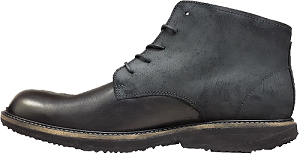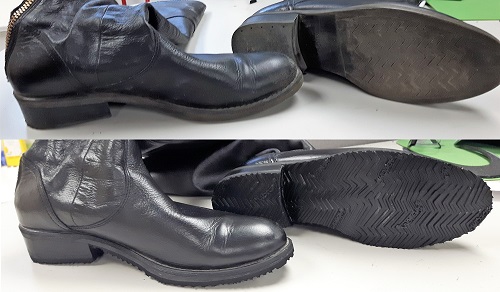
Shoe Modifications
Why Would I Need Shoe Modifications?

Ever find a shoe that was almost perfect, except for a small issue? Shoe modifications can help with the fit to improve comfort and reduce pain. There are small and easy modifications to improve shoe fit with minor issues, as well as more serious modifications for specific pain and conditions.
Leg Length Difference
If one leg is shorter than the other, a lift on one side levels out the legs. This difference may have developed from an injury, especially as a child, or from a hip or knee surgery. When the difference is small enough, a lift is placed inside of the shoe, under an insert. When the lift becomes too thick, the heel starts to slide out of the back of the shoe. If this occurs, the lift needs to be placed on the outside of the shoe.
Wide Feet and Bunions
First, find a proper fitting shoe, with a wide width. An orthopaedic shoe will have multiple widths to choose from, which can be available up to around 3E to 6E. To further accommodate a bunion, there are certain brands that will have a stretched bunion area.
If the foot still requires extra space, or needs a stretch in a specific area, there are shoe stretchers that will stretch the entire width of the shoe and specific spots.
When a shoe stretch does not provide enough room for the foot, a balloon patch or a sole split will provide the extra space. The balloon patch acts as a bunion pocket. To create this pocket, the original material is cut around the bunion and replaced with extra material. A sole split widens the sole to create more width in the shoe as well as a wider base. This split can be specific to a bunion, or to widen the entire shoe.
Bony Prominence
When there is a bony prominence on the bottom of the foot, this can be painful while walking and standing. An excavation is a modification to accommodate this bony prominence by removing part of the shoe. An excavation may be unnecessary with custom foot orthotics. When the prominence requires additional space that the orthotic cannot provide, the excavation may be used in combination with the orthotic.
If the prominence occurs on the top of the foot, alternative lacing techniques can be used. The most common lacing technique for this is to skip an eyelet where the prominence occurs. This opens the space for the prominence to prevent excessive pressure.
If the prominence occurs on the side of the foot, see the “wide feet/bunions” section above for options!
Forefoot/Ball of the Foot Pain
One of the ways to reduce forefoot pain is a rocker sole, which curves at the front of the shoe to take pressure off the ball of the foot. If the shoe is orthopaedic, the rocker sole may be built into the shoe already. If this is the case, the rocker sole can be increased. When you roll forward onto the ball of the foot at the end of a step, the rocker sole propels your forward to reduce the pressure on the foot.
Another way to deal with forefoot pain is a metatarsal bar, which further reduces pressure at the ball of the foot. A piece of material is added under the ball of the foot to take pressure away from the painful area and transfer it just behind.
Fused Ankle

A rocker sole may also be used for a fused ankle, but in addition to the rocker at the front of the shoe, it is also at the heel. This helps at the beginning and the end of a step when the ankle joint does most of the work. The rocker sole reduces the need for the ankle to bend at these two points of a step. In addition to the rocker sole, a SACH heel (solid ankle cushioned heel) reduces shock absorption. Soft material is added to the contact point at the heel, which reduces shock during the initial contact.
These are a few modifications that can be done to over the counter shoes. There are others not mentioned, as well as other uses for the modifications listed. Contact us for more details and individualized options!

You must be logged in to post a comment.